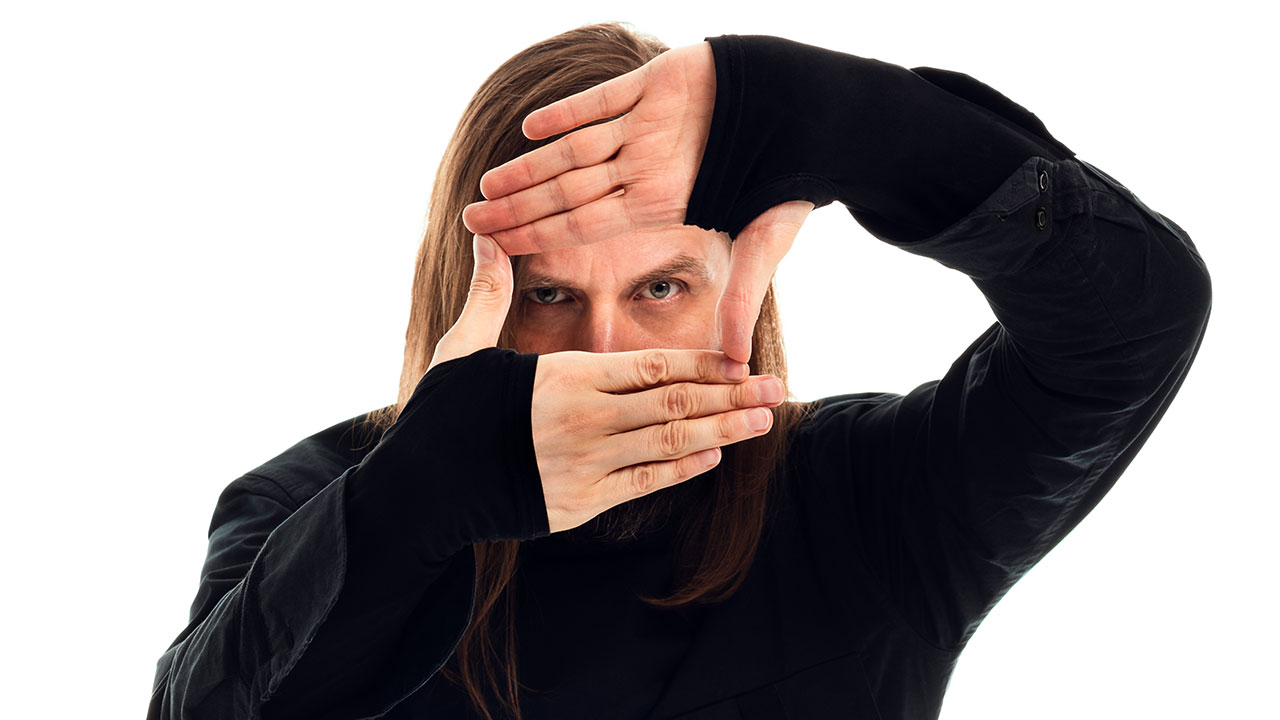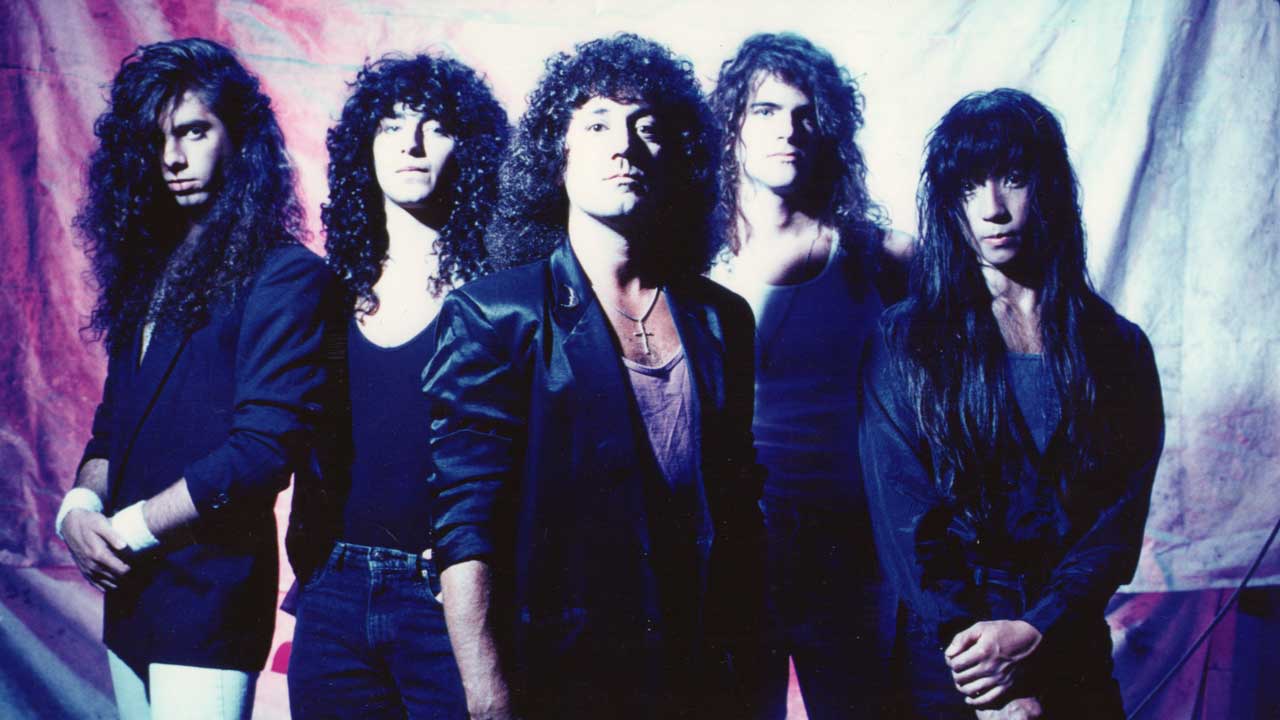Riverside's Mariusz Duda reveals the story behind his 'lockdown trilogy' of solo albums
In 2021, Riverside's Mariusz Duda looked inwards to release Claustrophobic Universe - the second of his lockdown trilogy. He discusses the Vangelis and Tangerine Dream tapes that inspired his minimalist electronic instrumentals

For certain musicians, an enforced period of seclusion can provide the space and time needed to reach into the soul and create something magical. Mariusz Duda, Riverside frontman and the driving force behind Lunatic Soul, took that imposed opportunity to write and record deliberately provocative solo albums, which will form part of the ‘lockdown trilogy’, which was eventually released in 2022.
“Having the time to be more creative is one of the bright sides of the pandemic,” says Duda from his home in Poland. “It makes me sad that musicians are struggling right now and having a really hard time. For instance, if you’re a musician who is connected with other composers or if you’re a session musician, then that’s really devastating. But if you’re an artist who can close himself away in the studio and create something new, it’s almost like paradise. You can do whatever you want. When Riverside stopped playing shows, I had more time. We did the new Lunatic Soul recording and after that, I needed a change. So, this became the beginning of a new adventure for me and now already there’s a second solo album.”
That freedom allowed Duda to move away from the more lush, progressive leanings of Riverside to reinvestigate a genre that has appealed to him throughout his career – electronica. For those not overly familiar with Riverside’s back catalogue, it’s a musical form that has sporadically perforated their work, not least with the release of their Eye Of The Soundscape instrumental compilation in 2016. His adoration of electronic music can be traced back to his childhood, when his exposure to music was aided by a weekly market, where a solitary stall sold the staple of 80s culture: cassette tapes.
“There was nothing connected with music at my home,” laments Duda. “The gramophone was in the cellar, covered by books and old destroyed vinyl. I had radio and I had the market. Every Tuesday, there was a guy selling cassette tapes and he only sold electronic music and death metal. Each week, I would be buying tapes by Obituary, Tangerine Dream, Vangelis, Mike Oldfield, Kraftwerk and Carcass. It was crazy and people at school were laughing at me. They said that I was drinking beer and milk at the same time. The funny thing was that as well as listening to that kind of music, I was also creating it. I had a mono cassette recorder, lots of tapes and I created my own. I think that was because I was jealous that the guy on the market wasn’t selling my music. So, I started to record my own albums, with the covers and stuff like that. Every month, I would create new music on my shitty keyboard and sometimes the piano. That’s why, in the lockdown times, I decided to bring back those memories and did the same again after 30 years. That also explains why I decided to release this album on cassette as the only physical format, as well as on Bandcamp.”
The project also provided Duda with an escape from the Riverside routine and the write-record-tour cycle that had begun to feel somewhat restrictive. Duda certainly isn’t unappreciative of the trappings of major album releases on a renowned label, but he admits to liking the immediacy of instantly revealing his compositions to the world online.
“I wanted to share this kind of music immediately and not have to be waiting five months, for 10 colours of vinyl production and some kind of super-deluxe edition,” he laughs dryly. “As a solo artist, I just went to the underground. I don’t know why I did this to be honest, although I have to admit that in the last few years, I felt like I was in a trap. I love to play progressive rock and bass guitar, but it’s always connected with hard work. Lunatic Soul became a much bigger project than it used to be, so I spent about two years on the last album. With this solo project, there’s a lot of improvisation and things connected with the right moment. ‘I’m in the studio, I’m going to record something right now and let’s leave it.’ Later we might add some layers and overdubs but let’s keep the core. I want to share my music from lockdown right now, without the whole procedure of needing to prepare singles and stuff like that. I was tired of that pattern, which is always the same when I release something with Riverside or Lunatic Soul. This time I said no to almost everything and that was refreshing. I could say, ‘I’ve just finished the album. Here you go. It’s on my Bandcamp, check it out.’ I really felt like a rebel doing these things.”
Musically, this second album, Claustrophobic Universe, is a change from the first release, Lockdown Spaces. It remains instrumental with a minimalistic approach, but there’s a more considered depth to the music and it’s less influenced by the soundtracks to 80s computer games than its predecessor. Additionally, it strikes more of an optimistic tone than the rather bleak, foreboding sounds that appeared on his solo debut.
Sign up below to get the latest from Prog, plus exclusive special offers, direct to your inbox!
“When I was creating Lockdown Spaces, I had only two weeks to do it,” he reveals. “It was written during the Lunatic Soul sessions. I was a little bit tired of the recording session and so I wrote it in between. That was inspired by the lockdown that we had one year ago. It was full of uncertainty, there was a lot of fear and that’s why the music was so dark. I mean, the composition Waiting is not even pleasant to listen to. But now it’s a year later, we have started to feel comfortable in this new reality, so the music has changed as well. It has altered into something more optimistic. Of course, this is still ‘the lockdown trilogy’, so on each album, I wanted to keep this feeling of still being in an enclosed area. It’s an album that’s inspired more by the journey into your own mind. It’s just like a wardrobe when you can find a door to Narnia.
“What was really great for me was that this time, I was able to spend three months in the studio just focusing on it,” he continues. “I had more time and you can probably hear that there are more layers and everything is better prepared. Of course, I didn’t want to repeat myself, so I decided that this time I would focus more on a different background. I also tried to get away from some other things, like the melodies. That’s not to say that in Claustrophobic Universe there aren’t any. There are, but they’re hidden, whereas on Riverside and Lunatic Soul they’re the main fundamental of the song structure. I’m still a huge fan of melodies but with this, I just wanted to put those melodies in a different place.”
Aside from the more obvious connotations for a trilogy recorded in this era of uncertainty, there are more subtle references which permeate the three albums. Granted, without lyrics it’s trickier to discern those influences which drive the compositions, but there’s a deliberate sense of escapist nostalgia, as Duda explains.
“Each album is associated with different attributes connected to my childhood,” he reveals. “On one layer, of course it is connected with the lockdown but on the second layer, it’s also connected with my moods. When you take a look at the titles on Claustrophobic Universe, there’s Waves From A Flat Earth, which is dedicated to people who don’t believe in things. On the third and most important level, these albums are linked to my childhood. So, for instance, when you take a look at Lockdown Spaces, it’s connected with retro videogames, which were my main inspirations and were a time killer for me when I was a child. Claustrophobic Universe is connected with cassette tapes and I believe the third album will be connected with comic books and books.”
The process has also been one of therapy for the bassist, finding solace in his escape to the studio to write and record music. That freedom has led to the creation of three albums in a relatively short space of time, with this spell of inventiveness also set to lead to a new Riverside album in 2022.
“When I’m struggling with my demons, I just write lots of music,” he confesses carefully. “With every album, I try to skip some medication stuff and just focus only on music, so for me, it’s always a therapy. On this album, there’s a composition called Lemon Flavoured Stars and the sound that you can hear at the very beginning are pills. But it is mostly pills connected with vitamin C and nothing that might be connected with bipolar disorder. I have given myself a small break but I’ve already begun working on the third recording. At the same time, I need to go back to Riverside because we’ve got plans for the summer. Maybe we should start to finally celebrate our 20th anniversary? After that, I will definitely be finishing my trilogy before the new Riverside chapter begins. I don’t want to record another solo album and to release this under the name of Riverside. I did this with the last two albums, which were mostly composed only by me. I just want to go back to a rehearsal room and to those times when we did more things together. We are slowly going back to our rehearsal room and I believe that [very soon] we will start to prepare something new.”
Somewhat endearingly, Duda isn’t an artist overly anxious with the reaction of his fans. His music has always been composed to provide self-satisfaction and these minimalist, electronic releases may prove challenging to some Riverside aficionados. That potential for negativity is something that Duda is undoubtedly aware of but blatantly unconcerned by.
“I really should release a pop album with songs because I know that people like that,” he reasons provocatively. “When we did the electronic Riverside song, Rapid Eye Movement [which appeared on the special edition of the album of the same name], there was a mixed response. There were people who said, ‘Wow, this is really progressive. You have tried to make something in different genres, this is really great.’ But then there were those people who were just giving it one star out of five because it wasn’t progressive metal. I mean, it wouldn’t be fair if I started to build something under my own name that sounded exactly like Riverside. I don’t have to prove anything to anyone. I don’t care. I don’t want to repeat myself because it would be boring for me. I just decided to create a totally different musical world and I don’t give a damn about what people think about it…”
This article originally appeared in Prog 121.
